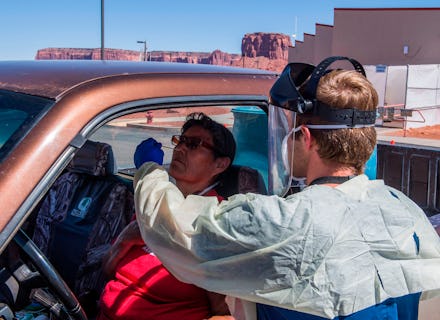Arizona has devised scorecards to determine which coronavirus patients get saved

It's been more than a decade since failed vice presidential candidate, failed governor, and failed reality TV host Sarah Palin popularized the patently bogus notion that providing Americans with health care would somehow create a series of federal "death panels" empowered to decide who deserves to live and die.
Despite Palin's fear-mongering, Obamacare nevertheless passed, and was signed into law, and so far the main thing that's happened is fewer people have gone bankrupt from medical expenses.
Still, the lingering specter of Palin's "death panels" has haunted the conservative discourse around health care for 11 years now, only to finally manifest this week into a horrifying reality in, of all places, Arizona — a state with a Republican governor and GOP-led legislature.
This week, Arizona Department of Health Services Director Dr. Cara Christ announced that hospitals could begun applying "crisis care standards" to their patients, as the state experiences a massive surge in coronavirus cases that threatens to overwhelm medical care facilities. Those standards essentially dictate how hospitals should triage patients, based on factors like age, pre-existing conditions, and likelihood of recovery. They also protect hospitals from lawsuits stemming from this ranking system for patients. There's even a points system to help doctors keep track of which patients deserve which level of care.
Despite their genteel title, the standards are more or less the sort of nightmare scenario Palin and her ilk were screaming about in 2009. Only this time, they're being activated in no small part thanks to the feckless policies and general disregard for public safety that have permeated the GOP, from the Trump White House on down.
“Discrimination against people with disabilities, older people, and people of color were acceptable and widespread in the past, and such discrimination continues to happen today,” J.J. Rico, the CEO of Arizona Center for Disability Law, said in a press release responding to the newly enacted standards. “And just like with other civil rights laws, we need to be explicit in the crisis standards of care about protections to ensure discrimination does not happen here.”
In its crisis standards of care document, the Arizona Department of Health Services goes out of its way to assuage criticism that it could be applied unequally to different patients.
All lives are precious. If resources are sufficient, all patients who can potentially benefit from therapies will be offered therapies. If resources are insufficient, all patients will be individually assessed. No one will be categorically denied care based on stereotypes, assumptions about any person’s quality of life, or judgement about a person’s “worth” based on the presence or absence of disabilities.
All patients, regardless of resource availability, will be treated with respect, care, and compassion. Triage decisions will be made without regard to basis of race, ethnicity, color, national origin, religion, sex, disability, veteran status, age, genetic information, sexual orientation, gender identity, quality of life, or any other ethically irrelevant criteria.
However, the ACDL along with a number of other civil rights disability advocacy groups have urged Arizona Gov. Doug Ducey (R) to modify the current standards to more explicitly protect against potential discrimination and uneven application. "While we all hope that Arizona health care providers are never faced with the types of decisions discussed here, clear guidance must be provided now," the groups said in a letter sent to Ducey, and other state health officials.
Ducey, meanwhile, has downplayed the immediate severity implied by activating the standards.
"It’s not needed today, but we’re anticipating that it will be there in the future," he insisted during a press conference this week. "This is our time to act to save and protect as many Arizona lives as possible."
Even doctors who advocated the activation of the standards seem horrified by what it entails. "Historically, our use of crisis care standards in the United States has been limited to terrorist attacks, mass shootings, battlegrounds, and aviation accidents," Dr. Christine Severance, a Phoenix family health provider who authored a petition to push Ducey to apply the standards, wrote. "What pains us most is that this was avoidable."